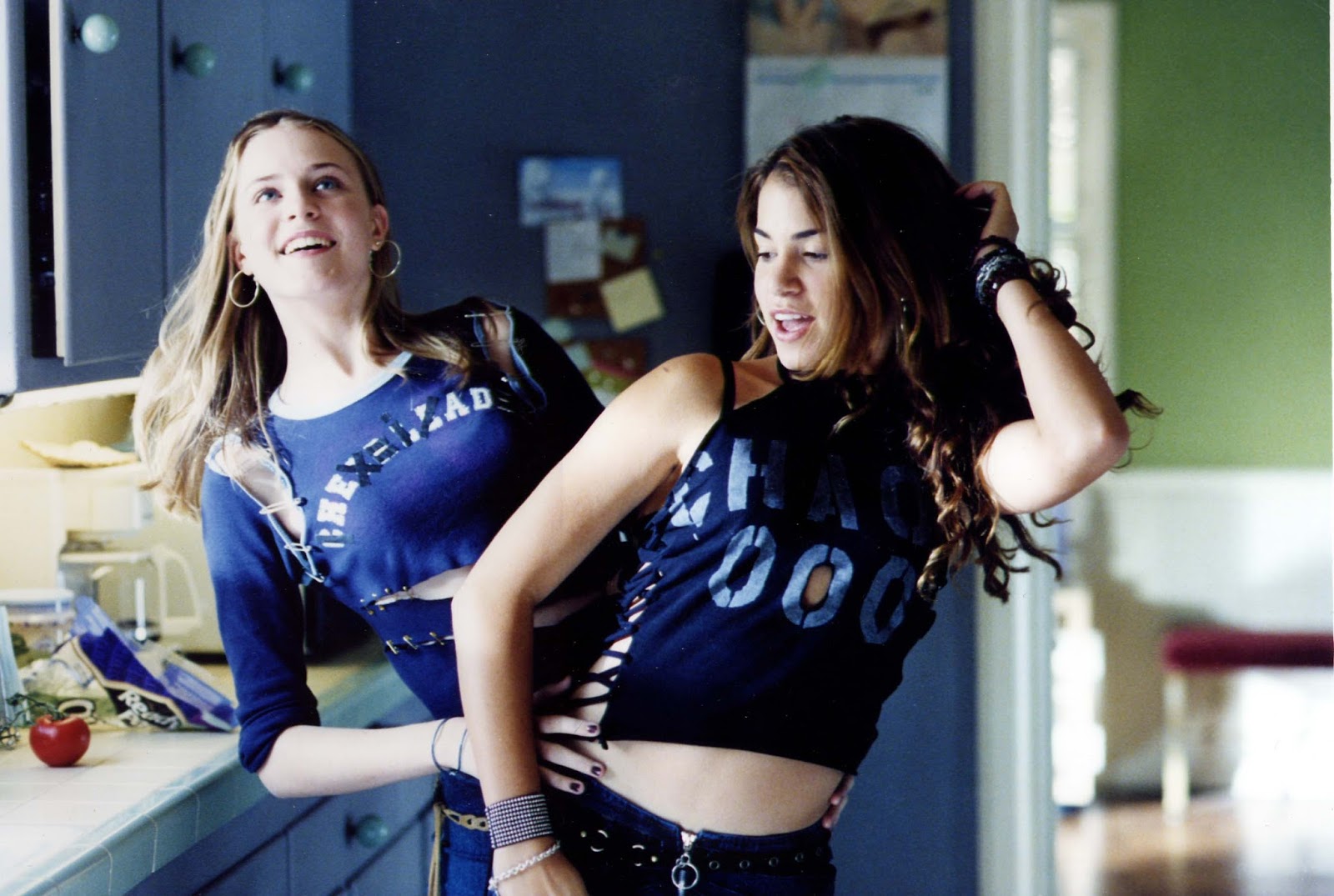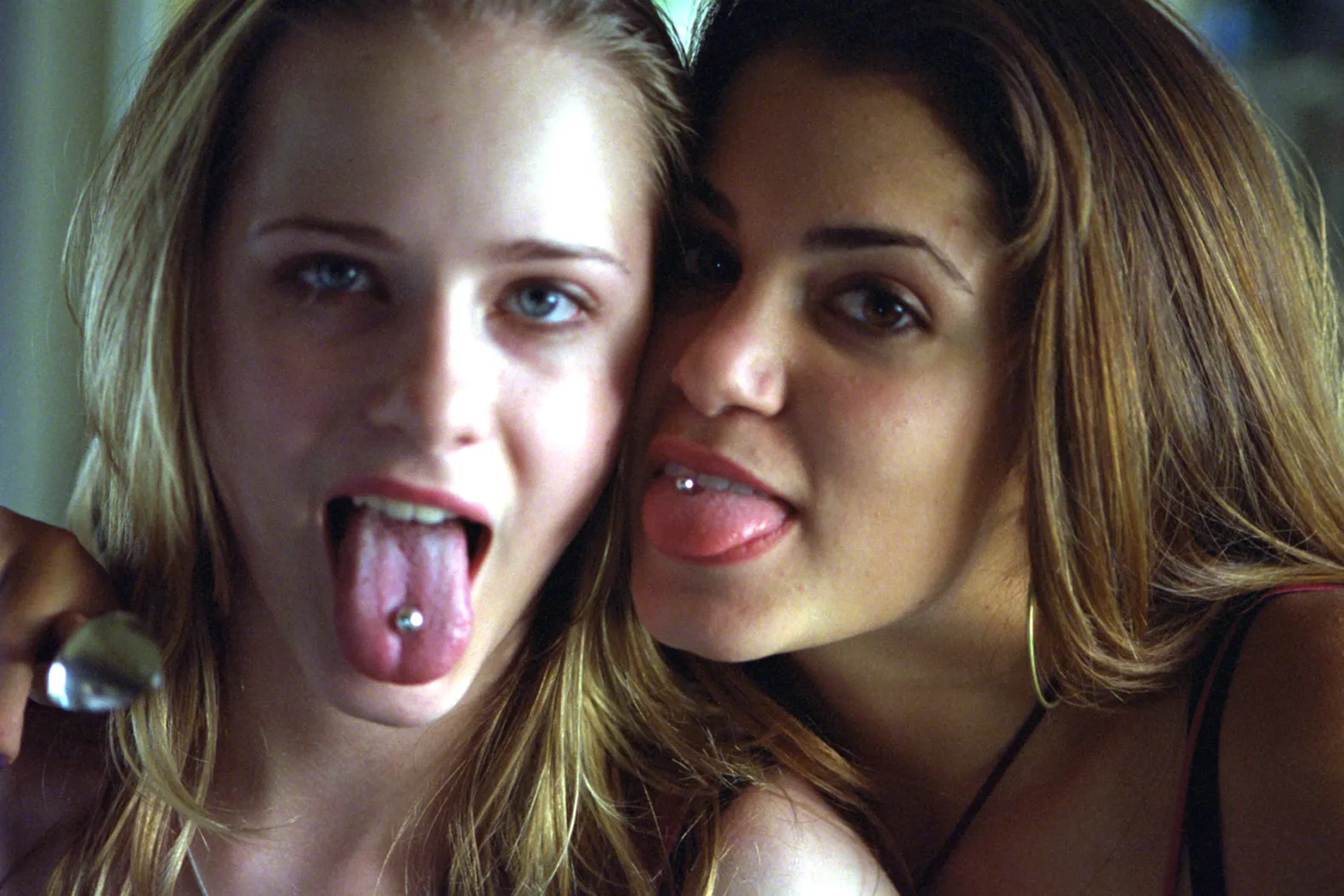My Problematic Fave: A juicy question with many answers: Catherine Breillat. Dollarama. Nina Simone's version of "I Loves You, Porgy" (it's not on Simone, she saves it from Gershwin, it's just the one I love). I would say Woody Allen's Husbands and Wives or Deconstructing Harry, but I think it's okay to enjoy those (so bleak and revealing, they are basically a confession), it's more problematic that I love Manhattan.
First Movie I went on a Date for: Sweet Home Alabama, a double date with my neighbourhood friend and two guys from another school we met hanging out (as teens do) after school hours at the playground. He thought I was crying during an emotional scene where Reese Witherspoon visits a grave in her hometown (A grandparent? Childhood dog?), but I was a cynical 14-year-old, and not then or now a Rom Com girl, and was trying to muffle my laughter.
My Movie/TV Character Style Icon: Julia Stiles in Hamlet, Kiera Knightley in Love, Actually, Satine in Moulin Rouge, Maggie Cheung and Nathalie Richard in Irma Vep.
The First Sex Scene I Ever Saw: I can't remember for sure, but probably Titanic.
… and it made me feel: Confused: it gave me absolutely no information on what sex actually is, only that there were certain signals I would one day understand (like the men who laugh knowingly when they see the fogged up windows). Also afraid: it seemed sex would always leave some trace, and you could not hide it from anyone. Also romantic: sex was fun and actually fine, no one was hurt by it or punished for it (although it did happen right before they hit the iceberg, but this was not a coincidence that my young mind internalized.)
Best Needle Drop: Most of the songs in Rushmore (but maybe "Oo La La" by The Faces the most). I didn't even know what those songs were when I watched it at 15, but I knew that they were perfect.
I Wish this Fictional Meal Existed IRL: This meal does exist, but I have never seen the timpano from Big Night out in the wild, and although it seems like something that is better in theory than in execution, I'm not sure I'll feel fully satisfied if I never try one.
Untouchable Classic that I hate: How do I even pick! Citizen Kane does very little for me (except Welles, who I find quite hot), 2001: A Space Odyssey is glacial and so British (I do think the scene approaching the monolith on the moon is fab), Bresson leaves me dry (a symptom, perhaps, of him casting actors because they're hot), I find Parasite shallow, I only like the scenes in Stalker before and after they go to the Zone, and I can't get past Jeanne Dielman's melodramatic ending (which became an irritating staple of art house film).
Celebrity I had on my wall as a teen
Frank Black Francis and Karen O.
My film/TV OTP is: I can't think of a time when I felt the ending of a film or show should have been different, I like when characters come together, I like when they fall apart.
The Reality TV Show I Would Win: I think it's obvious that my true place is not as a competitor, but as a judge.
Like Mean Girls (2004) released the following year, Catherine Hardwicke’s Thirteen (2003) is a cautionary tale of teenage social ascendancy, but with arguably higher stakes: when middle schooler Tracy Freeland becomes friends with the enviably cool Evie Zamora, she begins to test the limits of her working-class family through a series of drug and sex-fuelled escapades before she inevitably self-destructs and runs, makeup streaked with tears, into the arms of her struggling single mother. Unflinching if occasionally overwrought, the movie offers a portrait of the shift from childhood to adolescence in a city that, at least according to Hardwicke’s vision, forces that transition fast. The Los Angeles in Thirteen is bleaker than the candy-coloured city we might recognize from Clueless (1995), where teens drive shimmering Jeeps and wear designer clothes to math class, and more mundane than the city in Hardwicke’s follow-up, the skater biopic Lords of Dogtown (2005), where sunkissed himbos kickflip to celebrity. By contrast, Thirteen’s more grounded air of authenticity is supported by low saturation, a shoe-string budget, and the fact that Hardwicke wrote the script alongside an actual 14-year-old named Nikki Reed.

The unlikely screenwriting partners met because Hardwicke briefly dated Reed’s father, a relationship that echoes Tracy’s non-traditional household, at the centre of which is Tracy’s mother, played by Holly Hunter, perhaps a surrogate for Hardwicke herself. To assume the role, Hunter dulls her signature southern drawl into something more grounded. Here is a woman trying her best to keep it all together, the ashtray she hides in the drawer of her bedside table teeming with butts, her boyfriend in and out of recovery, her own AA sponsor on speed dial. Hunter plays this character so convincingly that when she screams during an argument with her daughter that she didn’t wish for this life, it’s easy to forget that this life isn’t hers.
This plausibility extends to Nikki Reed, who not only wrote the script but also co-stars as the untouchably popular Evie, Tracy’s fairweather friend and foil. Armoured in studded bracelets and low-rise jeans, Reed oscillates seamlessly between certified baddie and scared little girl, her stride confident when approaching a boy, her voice soft as a whisper when caught in a lie. During press for the movie, Reed underscored the script’s relatability by alluding to a history of what Hardwicke called “destructive activities” without getting into specifics. (“It’s a really cool feeling, but it lasts for only 20 seconds,” was the quote she gave about whippets; “my mom took me to get it done,” the response about her tongue piercing). Following the success of Thirteen, Reed found herself in teen dramas like The O.C. and the Twilight series (also directed by Hardwicke) before the roles began to fizzle out, her Wikipedia page now listing her as a “former actress,” her most recent credit from 2019. The roles Reed received were usually sexually precocious side characters, and while she plays these characters well, I wonder what would’ve happened to her career had she played the protagonist in her own movie.
"It’s her eyes I remember most clearly in the poster: innocent, defiant, and shockingly blue."
There are many possible reasons why Reed wasn’t cast as Tracy: maybe she didn’t want the role, anxious that audiences would draw parallels between her and the character she wrote; maybe playing the glamorous Evie was a form of wish fulfillment, a chance to become the kind of girl she never got to be; or maybe casting was out of her hands, decided by some executive who wanted a bigger name, someone whiter, a blonde. Whatever the case, the role of Tracy went to Evan Rachel Wood, who was catapulted to stardom as a result. Thirteen is considered Wood’s breakout performance, earning her a Golden Globe nomination for Best Actress alongside a spot on the now-iconic cover of Vanity Fair’s 2003 Young Hollywood issue, sandwiched between Alexis Bledel and Raven-Symoné, her leg grazing Lindsey Lohan’s. The attention the performance garnered is well-deserved. As Tracy, Wood transforms the restless rage of adolescence into the wildness of an animal trapped in its cage, quick to bite when provoked. Capturing the raw hubris of youth, she beats her chest and declares, with a hiss like a battle cry: NO BRA, NO PANTIES, NO BRA, NO PANTIES. A lot of this performance happens in the eyes, which Wood manipulates to look hurt, venomous, stoned. It’s her eyes I remember most clearly in the poster: innocent, defiant, and shockingly blue.
Wood went on to have a career full of the usual Hollywood ups and downs, including roles in critically acclaimed HBO dramas True Blood, Westworld, and Mildred Pierce, and a highly publicized relationship with Marilyn Manson, nearly 20 years her senior, who the actress later accused of assault. None of these accomplishments or salacious news stories stick out to me as much as the opening scene of Thirteen, forever seared in my mind as the epitome of teenage hedonism. Scored by blaring guitars, we watch Wood as she slowly touches her face with a passive curiosity, her eyes glazed over in the high of a whippet hit. As her hand repeatedly fingers her cheek, we see her eyes light up with a sudden epiphany, her mouth expanding into a coy smile. Then, with a glee disarming in its frenzy, the actress delivers instructions directly to the audience: “Hit me,” she says. “I’m serious; I can’t feel anything. Hit me!” I wasn’t huffing whippets the first time I watched Thirteen, but I knew that kids around me were, or else they were cracking their first beers, smoking their first joints, numbing their newfound pain in some way. Perhaps this scene stuck with me because its blunt naturalism, written by one teen and enacted by another, confirmed my sense that a series of firsts were just upon the horizon, in a place from which there was no return. Childhood is over, it seemed to insist. It was a statement that horrified, intimidated, and enticed me all at once, like a needle straight to the tongue.
Like Mean Girls (2004) released the following year, Catherine Hardwicke’s Thirteen (2003) is a cautionary tale of teenage social ascendancy, but with arguably higher stakes: when middle schooler Tracy Freeland becomes friends with the enviably cool Evie Zamora, she begins to test the limits of her working-class family through a series of drug and sex-fuelled escapades before she inevitably self-destructs and runs, makeup streaked with tears, into the arms of her struggling single mother. Unflinching if occasionally overwrought, the movie offers a portrait of the shift from childhood to adolescence in a city that, at least according to Hardwicke’s vision, forces that transition fast. The Los Angeles in Thirteen is bleaker than the candy-coloured city we might recognize from Clueless (1995), where teens drive shimmering Jeeps and wear designer clothes to math class, and more mundane than the city in Hardwicke’s follow-up, the skater biopic Lords of Dogtown (2005), where sunkissed himbos kickflip to celebrity. By contrast, Thirteen’s more grounded air of authenticity is supported by low saturation, a shoe-string budget, and the fact that Hardwicke wrote the script alongside an actual 14-year-old named Nikki Reed.

The unlikely screenwriting partners met because Hardwicke briefly dated Reed’s father, a relationship that echoes Tracy’s non-traditional household, at the centre of which is Tracy’s mother, played by Holly Hunter, perhaps a surrogate for Hardwicke herself. To assume the role, Hunter dulls her signature southern drawl into something more grounded. Here is a woman trying her best to keep it all together, the ashtray she hides in the drawer of her bedside table teeming with butts, her boyfriend in and out of recovery, her own AA sponsor on speed dial. Hunter plays this character so convincingly that when she screams during an argument with her daughter that she didn’t wish for this life, it’s easy to forget that this life isn’t hers.
This plausibility extends to Nikki Reed, who not only wrote the script but also co-stars as the untouchably popular Evie, Tracy’s fairweather friend and foil. Armoured in studded bracelets and low-rise jeans, Reed oscillates seamlessly between certified baddie and scared little girl, her stride confident when approaching a boy, her voice soft as a whisper when caught in a lie. During press for the movie, Reed underscored the script’s relatability by alluding to a history of what Hardwicke called “destructive activities” without getting into specifics. (“It’s a really cool feeling, but it lasts for only 20 seconds,” was the quote she gave about whippets; “my mom took me to get it done,” the response about her tongue piercing). Following the success of Thirteen, Reed found herself in teen dramas like The O.C. and the Twilight series (also directed by Hardwicke) before the roles began to fizzle out, her Wikipedia page now listing her as a “former actress,” her most recent credit from 2019. The roles Reed received were usually sexually precocious side characters, and while she plays these characters well, I wonder what would’ve happened to her career had she played the protagonist in her own movie.
"It’s her eyes I remember most clearly in the poster: innocent, defiant, and shockingly blue."
There are many possible reasons why Reed wasn’t cast as Tracy: maybe she didn’t want the role, anxious that audiences would draw parallels between her and the character she wrote; maybe playing the glamorous Evie was a form of wish fulfillment, a chance to become the kind of girl she never got to be; or maybe casting was out of her hands, decided by some executive who wanted a bigger name, someone whiter, a blonde. Whatever the case, the role of Tracy went to Evan Rachel Wood, who was catapulted to stardom as a result. Thirteen is considered Wood’s breakout performance, earning her a Golden Globe nomination for Best Actress alongside a spot on the now-iconic cover of Vanity Fair’s 2003 Young Hollywood issue, sandwiched between Alexis Bledel and Raven-Symoné, her leg grazing Lindsey Lohan’s. The attention the performance garnered is well-deserved. As Tracy, Wood transforms the restless rage of adolescence into the wildness of an animal trapped in its cage, quick to bite when provoked. Capturing the raw hubris of youth, she beats her chest and declares, with a hiss like a battle cry: NO BRA, NO PANTIES, NO BRA, NO PANTIES. A lot of this performance happens in the eyes, which Wood manipulates to look hurt, venomous, stoned. It’s her eyes I remember most clearly in the poster: innocent, defiant, and shockingly blue.
Wood went on to have a career full of the usual Hollywood ups and downs, including roles in critically acclaimed HBO dramas True Blood, Westworld, and Mildred Pierce, and a highly publicized relationship with Marilyn Manson, nearly 20 years her senior, who the actress later accused of assault. None of these accomplishments or salacious news stories stick out to me as much as the opening scene of Thirteen, forever seared in my mind as the epitome of teenage hedonism. Scored by blaring guitars, we watch Wood as she slowly touches her face with a passive curiosity, her eyes glazed over in the high of a whippet hit. As her hand repeatedly fingers her cheek, we see her eyes light up with a sudden epiphany, her mouth expanding into a coy smile. Then, with a glee disarming in its frenzy, the actress delivers instructions directly to the audience: “Hit me,” she says. “I’m serious; I can’t feel anything. Hit me!” I wasn’t huffing whippets the first time I watched Thirteen, but I knew that kids around me were, or else they were cracking their first beers, smoking their first joints, numbing their newfound pain in some way. Perhaps this scene stuck with me because its blunt naturalism, written by one teen and enacted by another, confirmed my sense that a series of firsts were just upon the horizon, in a place from which there was no return. Childhood is over, it seemed to insist. It was a statement that horrified, intimidated, and enticed me all at once, like a needle straight to the tongue.


